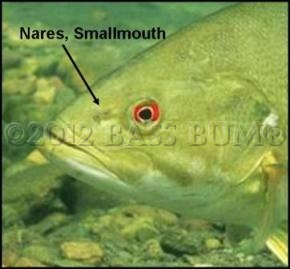Bass Smell - No Kidding
A feeding response is triggered when bass smell prey, maybe even your lure.
There is much debate about the importance bass smell plays in the life and survival of bass. It is well established that bass are first and foremost sight feeders and that sight is their most important sense.
However, it's only logical that, since a bass is a predator built to respond to its environmental stimuli as they relate to its three main purposes in life, eating, reproducing and surviving, when we're trying to catch one we're better off to appeal to as many of its senses as possible. Even if the bass' sense of smell is secondary to its eyesight and hearing, we must not overlook its sense of smell when hunting them.

How does a bass smell? Is its smell and taste the same thing?

Bass smell through four nostrils (nares) located in pairs on each side of its head between the mouth and eyes. One pair takes in water, the other serves as an exit. Between these is a chamber filled with folds (olfactory rosette) that sample the water and send the brain a message, without passing through the mouth, that either rings the dinner bell or tells them to "boogie" in the other direction. Bass don't breathe with their noses so the message is sent directly to the brain without any diminution. This why some argue that the bass sense of smell is so keen. They use their noses for only one thing, smelling!
What bass do smell (olfaction) or taste (gustation), and they can smell far more substances than they can taste, are any substances that are water soluable, are disperesd in single molecule form and can bind to the receptor cells. Though there are many substances that meet these requirements, for bass swim around in a world of dissolved chemicals coming from rocks, vegetation, crawfish and minnows, the most important being the amino acids. Amino acids are the building blocks of all living cells so are found in all the prey bass eat. Each, be it a leech, crawfish or minnow, has its own unique smell and taste to which the bass is genetically programmed to accept as food.
On the other hand, bass taste is experienced via thousands of taste buds, like humans. They are found on the tongue, sides of the inner mouth, on their gills and even down their throats. These teardrop shaped buds rest in a small cavity filed with receptor cells. Each has an individual hair extending from it which detects single scent (chemicals) molecules that send messages to the brain. The bass can only taste single molecules in water that fit into these cavities. If single molecules are not a fit there is no message generated to the brain about that scent.
This creates a limitation on substances that can stimulate the bass' sense of smell or taste. If the substance is other than in single molecule configuration, such as water-insoluble substances like oil and fat, which are rarely dispersed as single molecules, the bass most likely will not even know it is there. This becomes important relevant to the use of fish attractants.
Interestingly enough research has shown that bass are particularly stimulated by sugar, salt, acids, alchohol (maybe we should soak our lures in beer or Jack Daniels) and bitter substances. Sweet, sour, salt and bitter, just like humans.

Bass Smell and Bass Taste, the Final Gate Keepers!
Bass may smell and taste water-soluable chemicals the same way but they influence completely different behavior in bass. Smell is primarily long distant and functions to "alert" the bass that "food is close". If hungry, the bass may start looking for the food. That doesn't mean it takes out like a blood hound tracking the latest escapee from the chain gang. Bass are not very good at tracking oders because odors disperse very rapidly in water leaving no trail.
Furthermore, as with the inner ear, both nares are very close together on the head so receive odors simultaneously with no indication as to direction. Two exceptions to this might be when the source of the odor is within a foot or so of the bass or when the oder is coming downstream in a creek or river. The bass may well know direction in these cases. Otherwise bass, just as fishermen at a shore lunch do when they first smell the catch of the day cooking, start looking around for the grill. Remember, they're primarily sight feeders!
After the bass is awaken by the smell of potential food, it begins to visually search for its source while at the same time its brain is analyzing the odor as to whether it's something it would want to eat. When it finally sees the target and approaches close it will strike.....UNLESS, something just isn't right. Maybe it smells funny, a hint of nicotene or DEET perhaps. If so, it will veer away cancelling its attack.
But, if the object's smell is within the genetically programmed range of acceptable foods the bass sucks it in its mouth. Here the object comes in contact with the taste buds, the final gate keeper that determines if the bass bites and retains the food. Does it taste bad, is it too hard? Is it food or not? If not...Ptooey....out it goes in a blink of an eye, in less than a second and the angler didn't even know the bass was there.
Do bass smell and bass taste play a role in catching bass?
Go Back To Bass Fish from Bass Smell.
